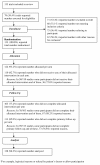A review of reporting of participant recruitment and retention in RCTs in six major journals
- PMID: 19591685
- PMCID: PMC2717957
- DOI: 10.1186/1745-6215-10-52
A review of reporting of participant recruitment and retention in RCTs in six major journals
Abstract
Background: Poor recruitment and retention of participants in randomised controlled trials (RCTs) is problematic but common. Clear and detailed reporting of participant flow is essential to assess the generalisability and comparability of RCTs. Despite improved reporting since the implementation of the CONSORT statement, important problems remain. This paper aims: (i) to update and extend previous reviews evaluating reporting of participant recruitment and retention in RCTs; (ii) to quantify the level of participation throughout RCTs.
Methods: We reviewed all reports of RCTs of health care interventions and/or processes with individual randomisation, published July-December 2004 in six major journals. Short, secondary or interim reports, and Phase I/II trials were excluded. Data recorded were: general RCT details; inclusion of flow diagram; participant flow throughout trial; reasons for non-participation/withdrawal; target sample sizes.
Results: 133 reports were reviewed. Overall, 79% included a flow diagram, but over a third were incomplete. The majority reported the flow of participants at each stage of the trial after randomisation. However, 40% failed to report the numbers assessed for eligibility. Percentages of participants retained at each stage were high: for example, 90% of eligible individuals were randomised, and 93% of those randomised were outcome assessed. On average, trials met their sample size targets. However, there were some substantial shortfalls: for example 21% of trials reporting a sample size calculation failed to achieve adequate numbers at randomisation, and 48% at outcome assessment. Reporting of losses to follow up was variable and difficult to interpret.
Conclusion: The majority of RCTs reported the flow of participants well after randomisation, although only two-thirds included a complete flow chart and there was great variability over the definition of "lost to follow up". Reporting of participant eligibility was poor, making assessments of recruitment practice and external validity difficult. Reporting of participant flow throughout RCTs could be improved by small changes to the CONSORT chart.
Figures
References
-
- Devereaux PJ, Manns BJ, Ghali WA, Quan H, Guyatt GH. The reporting of methodological factors in randomized controlled trials and the association with a journal policy to promote adherence to the Consolidated Standards of Reporting Trials (CONSORT) checklist. Control Clin Trials. 2002;23:380–388. doi: 10.1016/S0197-2456(02)00214-3. - DOI - PubMed
Publication types
MeSH terms
Grants and funding
LinkOut - more resources
Full Text Sources
Miscellaneous




